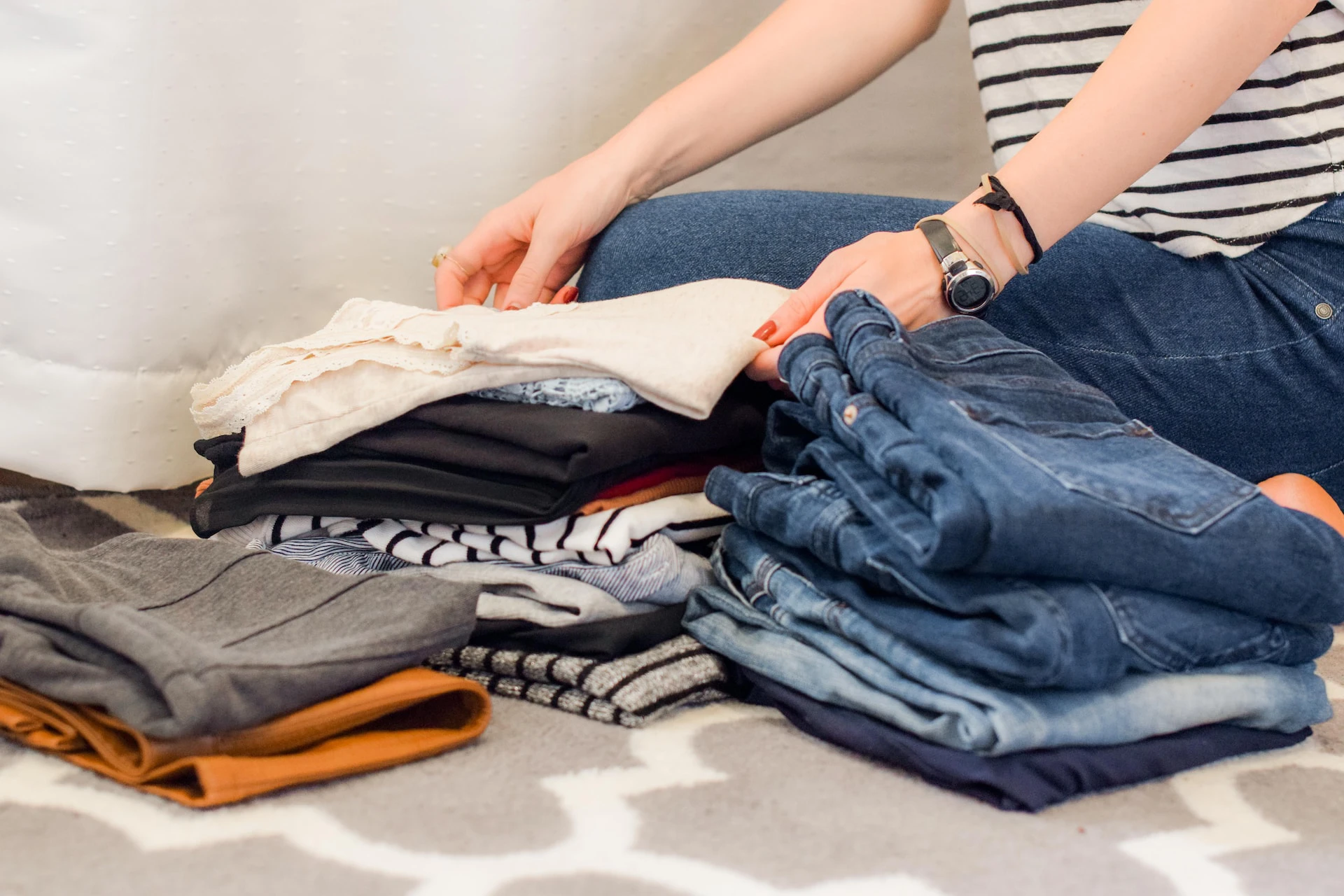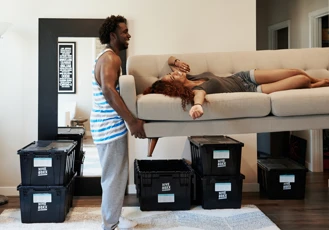Moving home is an exciting experience that often marks the start of a new chapter in our lives. Whether you’re relocating to a new city, upgrading to a bigger home, or downsizing to a smaller place, moving presents an opportunity for change and growth.
While it can certainly be stressful, the good news is that with some planning and preparation, you can reduce the stress of moving and make the whole process more enjoyable. We’ve put together a start-to-finish guide for your next home move.
Budgeting
The first step when getting ready to buy a house is working out what your budget is and how much you can afford to save. Whilst it’s great to set yourself targets, it’s important to be realistic about what’s achievable within your timeframe. Setting impossible goals can add to your stress and make you feel like you’re failing, when really, that may not be the case at all.
Our mortgage advisers are on hand to help you work out your finances and determine how much you could potentially afford to borrow, so please don’t hesitate to get in touch.
How to save money to buy a house
For many buyers, the priority is saving for a deposit. Figuring out your monthly finances in terms of your incomings against your outgoings, will help you ascertain how much you can realistically afford to save without cutting yourself too short for other things, such as socialising etc. This is a great starting point as it can really put into perspective where your money is actually going, and might help you to make some easy cutbacks that you won’t even notice.
Don’t forget that you don’t have to do this completely on your own. There might be government schemes, or potentially help from parents that could help get you where you want to be on the property ladder.
The best way to save for your first home
When it comes to saving for your first home, there are many different approaches you could take. Some of them may be rather drastic, such as cutting back majorly on your spending, selling expensive belongings etc. Some people even chose to move back in with parents in order to save on the rent. Whilst these are all valid ways of saving money, if you aren’t able, or don’t want to, do anything on this scale, there are plenty of smaller things you can do that will still make a difference when it comes to building your savings.
Trying to manage and make sense of your own finances can sometimes feel overwhelming, but that’s why we’re here to help. Please don’t hesitate to reach out and ask for help, even if it’s just to double-check what you’re currently doing is right. We’re here to help.
How to buy your first home with a small deposit
If you’re worried that your current deposit amount is too small, then we can help point you in the right direction and make sure you’re doing everything you possibly can to build your deposit up.
We can discuss the impact that little differences here and there can have on your savings, such as using price comparison websites for utility bills, and cancelling unnecessary or redundant subscriptions. Then there’s the bigger things you may not have considered, such as using government saving schemes like the Lifetime ISA, and improving your credit score to put you in the best position possible of being accepted for the mortgage you want.

Getting a mortgage
Buying a home is a major milestone in life and getting a mortgage is often a necessary step in the process. While it may seem overwhelming, you can ease some of the stress by taking the time to understand the process behind getting a mortgage. First, you’ll need to work out how much you can afford.
Looking at your affordability
Before you really start house-hunting, it’s important to determine how much you can afford to spend on a property. You can use our mortgage calculator to get a sense of what your monthly payments could look like.
You could also speak with a mortgage adviser who can help you work out an approximate figure. Obviously factors like interest rates can change, so there may be some minor variations.
How much can I borrow?
Now that you know how much money you could borrow, you'll probably want to know how much this will cost you each month?
Start your mortgage search today and find out what your monthly repayments could be.
Get pre approval
While you’re speaking with an adviser, it can help to start the process of getting pre-approved, otherwise known as a mortgage in principle. A mortgage in principle makes you a stronger buyer, as it’s a way of proving your affordability.
To get this, you’ll need to provide some basic information about your income, assets, and debts to a lender, who will work out your affordability. They will run a soft credit check as well, though this shouldn’t affect your credit score.

Shop around
Once you’ve worked out what you can afford, you can start looking around for a mortgage. Remember, a mortgage is not a one-size-fits-all product, and what worked for your friends and family may not suit you. Do some research and ask some questions about what’s on offer to get a good sense of the terms and conditions each mortgage comes with.
You can either work with a mortgage adviser here or go straight to a lender, though a mortgage adviser will often have access to deals that aren’t available on the high street.
One of the major things you’ll need to consider when looking at buying a home is assessing your credit score.
All about credit
Making sure you have a good credit score will ensure you’re in the strongest position possible when applying for your mortgage. Your credit score informs a lender as to how reliable you are financially and, most importantly, how likely you are to pay your loan back. As well as increasing your chances of being approved by a lender, a good credit score can improve your borrowing options and increase your eligibility for a wider range of loans, credit cards, and mortgage products.
Checking your credit score
Before you even think about applying for a mortgage, you’ll need to check your credit score to get a general idea of how a lender may perceive you. We recommend that you do this several months before you apply, so that you have enough time to address any issues. Checking your credit score is usually free and only takes a matter of minutes, and you can undertake a basic credit check using reference agencies like Experian, Equifax and Callcredit.
Your individual credit report provides information used to calculate your credit score. This usually falls between 300-850, though some go higher, like Experian, who scores up to 999. Most companies deem 300-579 to be a low credit score. Typically, a good credit score is measured by three factors, all of which assess how well you have managed your finances in the past. This includes your payment history, level of debt, and length of credit history.
How can I improve my credit score?
While improving your credit score takes time, there are some things you can do to help:
- Pay your bills promptly, as late or missed payments can have a huge impact
- Always pay off debts as quickly as possible
- Maintain a low credit balance
- Monitor your credit report to ensure it’s accurate

The importance of a good credit score
A good credit score will not only increase your chances of getting approved for a mortgage, but can also result in you receiving a more competitive interest rate. In contrast, a poor credit score can make it harder to secure a mortgage, as lenders may perceive you as a riskier borrower. This means they are likely to offer you a less competitive interest rate, require a larger deposit from you, or decline your application altogether.
You should note that a good credit score alone does not guarantee mortgage approval, as lenders will also consider other factors, such as your income and employment status. However, having a good credit score can certainly increase your chances of getting approved, helping you to secure a mortgage deal that’s right for you.
Applying for your mortgage
Once you have chosen a lender and a mortgage product (of which there are a few different types), you’ll need to actually apply! You’ll need to provide a variety of documents which outline your income, employment, debts, and assets, as well as details about your deposit and where it came from.
An adviser will be able to help you at every stage of this process. Once you have been approved you can start the process of moving into your new home!
Moving checklist
Moving home can be an exciting experience, but whether you're relocating to a new city, downsizing to a smaller space, or upgrading to a larger home, it’s best to be as prepared as possible to make the process as seamless as possible.
There is lots to think about, from packing up your belongings to coordinating with movers and changing your address. However, with careful planning and preparation, you’ll be in your new home in no time.
A key tool to help you manage stress when moving is a moving checklist, which can help you stay organised and on track, ensuring that you don't forget any important tasks or details during the moving process.
Where to start
Organisation is crucial for a successful house move. While some people have a natural knack for it, others may need to use other resources to ensure a smooth transition.
Whether it's spreadsheets, colour-coded labels, or lists, find a technique that works for you that will help you stay on schedule and avoid the clutter and disarray that comes with moving.
Our top tip is to have a good and thorough declutter before you start, as this can save you money on removals and prevent you from transporting unnecessary items.
Get organised and start decluttering
If you're moving house soon, decluttering your home is a crucial first step in the process. Over time, our belongings can accumulate, often without us even realising it. This can be a problem when trying to sell your home, as it can give the impression of a lack of space, and potential buyers may have a hard time envisioning themselves in your space. However, there are several effective ways to declutter your home before you move.
Consider putting together a plan that helps you tackle one area at a time, working room by room through your house. Make keep, sell, and donate piles as you go and set aside a day to organise the things you’re not keeping. Whether that’s taking pictures and listing them online, or taking them to a local drop-off point. By taking a proactive approach to declutter, you can streamline your move, reduce your workload, and create a more spacious and organised environment in your new home.


How to survive moving day
Moving day can be inherently chaotic, but careful planning and preparation can help make the process smoother and more manageable. In addition to creating a moving day survival kit with snacks, drinks, and toiletries, consider packing a box with important documents and essentials that you'll need immediately upon arrival. This box should be loaded onto the truck last, making it easy to access when you arrive at your new home.
Prioritising the order in which boxes are loaded onto the truck can also save you time and hassle when it comes to unloading. It's also important to label boxes clearly, making it easier to navigate the unloading process.
Be sure to enlist the help of friends and family and give everyone clear tasks. This minimises back and forth and makes it easier for everyone to get their job done.
Getting a mortgage for your next home
With a positive attitude and a bit of planning, you can make the home moving experience more manageable and exciting. From decluttering and packing, to sorting out your budget and credit score, there are plenty of steps you can take to make your move as smooth as possible.
If you’re looking at moving home soon and haven’t yet secured a mortgage, get in touch with one of our expert mortgage advisers.
With access to more than 90 lenders and over 12,000 deals, we’re perfectly positioned to help you find a mortgage that suits your individual needs and circumstances.
Important information
Your home may be repossessed if you do not keep up repayments on your mortgage.
There may be a fee for mortgage advice. The actual amount you pay will depend on your circumstances. The fee is up to 1% but a typical fee is 0.3% of the amount borrowed.
Related Articles
Common fears and concerns of first time buyers
Don't let first time buyer fear hold you back from owning a home. Read our guide to common house buying fears to learn how to best to conquer them and ease your nerves.
< 80 views | 1 year ago
How to buy a house
Buying your first home can feel both exciting and a little bit overwhelming, but if you take one step at a time, you’ll find things aren’t as scary as they seem.
170 views | 4 months ago
Help for first time buyers
In what will be a post-Help to Buy market, it's clear that there needs to more done for first time buyers to help combat major shifts in the UK's housing market. How can brokers and lenders help?
< 50 views | 8 months ago
No posts currently available




